HOME >> CHINA
China promotes breast-feeding policies as birth rates decline
By Zhang Dan Source:Global Times Published: 2019/8/4 18:10:29
○ Before the World Breast-feeding Week, Guangzhou, capital of South China's Guangdong Province, pushed forward China's first local legislation of breast-feeding promotion
○ China's exclusive breast-feeding rate within the first six months of life was 20.8 percent in 2013, lower than the average level (37 percent) of middle-income and low-income countries in the world: UNICEF
○ Vietnam succeeded in promoting breast-feeding by revising the country's labor law to allow mothers longer maternity leave and banning advertisement of breast milk substitutes for infants under 2 years old
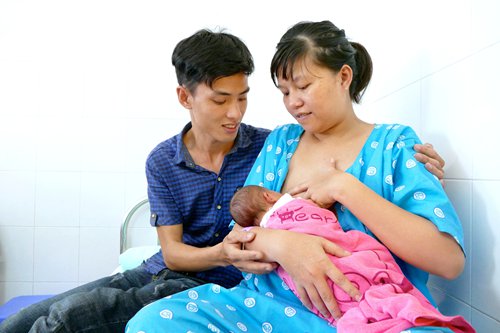
"I found only a few baby care facilities in Xi'an. Only newer shopping malls have baby care rooms and not every floor has one," Yan told the Global Times.
As a result, she always takes a cloth when she goes out with her baby. "Whenever I need to breastfeed my child, I will find a quiet place and use the cloth to cover my breast," Yan said.
The World Health Organization (WHO) and the United Nations Children's Fund (UNICEF) said breast milk is the best source of nutrition for newborns and infants under 2, and contribute the most to children's health and growth.
In China, the issue is more necessary as the country is experiencing a declining birth rate.
The country's exclusive breast-feeding rate within the first six months of life was 20.8 percent in 2013 - lower than the average level (37 percent) of middle-income and low-income countries in the world, according to UNICEF's 2018 data. Proposed by the National Health Commission in the National Nutrition Plan (2017-2030), China aims to reach the exclusive breast-feeding rate for infants under 6 months to at least 50 percent by next year.
Facing the global challenge, Vietnam has realized the importance of breast-feeding and started a breast-feeding revolution in 2012.
Prior to World Breast-feeding Week (August 1 to 7), the Global Times reporter visited Vietnam for a close look at breast-feeding promotion.
Help group
"I felt lonely at that time. None of my family members understood me," Nguyen Thi Thao, a single mother, shared her breast-feeding experience at a meeting in Hanoi in July.
After her child was born, she gave the infant formula milk, after which the baby refused to breast-feed. Under family pressure, however, she insisted on breast-feeding.
By chance, she discovered a Facebook group called "Bé Tí Bú Ti" ("infants need breast milk") which has 250,000 members. Things changed with the help of many mothers like her after Nguyen joined the group.
"The information on breast-feeding in this group is more helpful and reliable than what I saw online. The mutual-help group made me feel I was not alone." She said mothers just take their babies out, meet in a park to exchange experiences about breast-feeding.
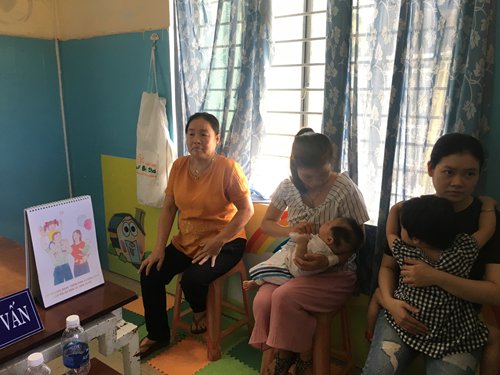
In Vietnam, women account for 48 percent of the labor force aged between 16 to 64 years old. Among them, 20 to 25 percent have social insurance and six months' paid maternity leave, said Phan Thi Hong Linh, Southeast Asia regional program coordinator of Alive and Thrive (A&T), a global nutrition initiative.
To cover mothers living in the countryside who lack enough and proper knowledge about breast-feeding, since 2010, A&T and the Vietnamese government partners have been conducting the "Little Sun Social Franchise" project. More than 1,100 clinics in Vietnam were opened within the government health system for mothers to seek help on breast-feeding, complementary feeding (foods and liquids introduced at 6 months of age), and child health.
In a village called Hoa Phong commune in Hoa Vang district in Da Nang, which is a popular tourist destination, doctors at the village clinic said women's perception of breast-feeding has changed.
Some mothers in rural areas thought milk formulas were better and more nutritious than breast milk, which is a misconception, said Nguyen Kiem, head of the Hoa Phong Health Center.
"Since we operated the 'Little Sun' counseling service, the exclusive breast-feeding rate in our village has increased to more than 80 percent, with the stunting rate declining from 20 to 8.3 percent, and underweight rate from 13.5 to 5.8 percent," Nguyen Kiem said such a service may change the lives of more than 200 newborns in the village.
Legislative work
One of the most outstanding and decisive developments in Vietnam to promote breast-feeding is the law revision to better protect the rights of mothers.
In 2012, Vietnam lengthened paid maternity leave for female employees from four to 6 months. In the same year, the country's advertising law also prohibited breast milk substitute ads for children under 2 years old. In the following years, many employers set up lactation rooms for mothers in the work place.
However, while the law was being revised, various stakeholders battled for their own rights.
Since a growing number of women joined the labor force, Vietnam stood out. For companies which have a higher portion of female workers, such as in the textile, shoes manufacturing, aquatic products and electronic packaging industries, supporting amendments to the law is one of their key challenges, noted Truong Quoc Hung, deputy director general of the Institute for Legislative Studies under Vietnam's National Assembly Standing Committee.
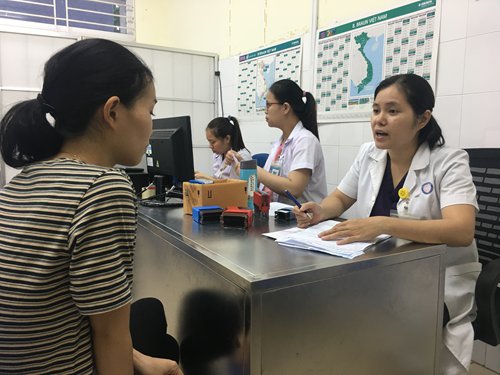
The key concerns included women's willingness to extend their maternity leave, whether social insurance can shoulder the expenses and if the competitiveness of women would be affected.
Hung told the Global Times that female workers may lose their jobs if they have longer maternity leaves, but Vietnam's Labor Code protects mothers. Still, policymakers need to balance the economic impact on companies and the health of future generations. They also need to increase female employers' working ability.
"I think women's rights and interests have greatly improved, especially in industrial parks," Pham Thi Thanh Hong, former deputy head of the Department of Female Workers Affairs, Vietnam General Confederation of Labor, told the Global Times.
Breast-feeding in China
Discussions on whether mothers should breast-feed in public always appear on Chinese social media. Some complain that the mothers who exposed their breasts in public do not consider other people's feelings, while some support the mothers.
Whether exclusive breast-feeding is necessary is also hotly debated on cyberspace as some new mothers find it difficult.
"My son was starving in the first three days after being born because I didn't have any breast milk," a Beijing-based mother of a 9-month-old infant said. She said that her family insisted on breast-feeding her son because that will lead to better physical conditioning.
However, no matter what method she used, she could only produce little breast milk, which put her under immense pressure. "I wanted to give up exclusive breast-feeding. Some milk formulas can satisfy the needs of newborns," she noted. Even though the country initiated plans to promote exclusive breast-feeding, mothers should decide whether to do so based on their family and personal conditions, she said.
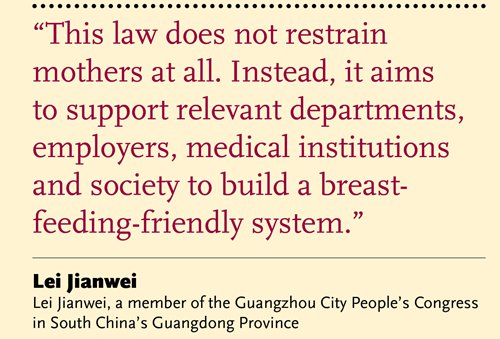
Many provinces, including Henan, Liaoning and Guangdong, have plans to promote mother/infant-friendly facilities, the Xinhua News Agency reported in March.
Guangzhou for instance, opened 658 baby care rooms last year. The city is now pushing for the first local legislation on China's breast-feeding promotion work, which is expected to be passed within the year, according to Lei Jianwei, a member of the Guangzhou City People's Congress style and the primary voice for breast-feeding.
"Some people questioned why their choice to breast-feed their children was being curtailed," Lei said at the Breast-feeding Promotion Forum in Beijing on August 1.
"This law does not restrain mothers at all. Instead, it aims to support relevant departments, employers, medical institutions and society to build a breast-feeding-friendly system," he explained.
On extending maternity leaves, Lei told the Global Times the limits of Guangzhou's legislative authority cannot achieve that.
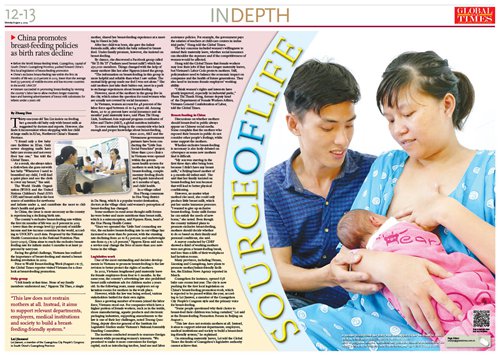
Newspaper headline: Source of life
○ China's exclusive breast-feeding rate within the first six months of life was 20.8 percent in 2013, lower than the average level (37 percent) of middle-income and low-income countries in the world: UNICEF
○ Vietnam succeeded in promoting breast-feeding by revising the country's labor law to allow mothers longer maternity leave and banning advertisement of breast milk substitutes for infants under 2 years old

A mother breastfeeds her baby with the support of her husband at a hospital in Vietnam. Photo: Courtesy of Alive and Thrive
Thirty-one-year-old Yan Lin insists on feeding her 4-month-old baby only with breast milk as suggested by doctors and experts. However, she finds it inconvenient when shopping with her child at large malls in Xi'an, Northwest China's Shaanxi Province."I found only a few baby care facilities in Xi'an. Only newer shopping malls have baby care rooms and not every floor has one," Yan told the Global Times.
As a result, she always takes a cloth when she goes out with her baby. "Whenever I need to breastfeed my child, I will find a quiet place and use the cloth to cover my breast," Yan said.
The World Health Organization (WHO) and the United Nations Children's Fund (UNICEF) said breast milk is the best source of nutrition for newborns and infants under 2, and contribute the most to children's health and growth.
In China, the issue is more necessary as the country is experiencing a declining birth rate.
The country's exclusive breast-feeding rate within the first six months of life was 20.8 percent in 2013 - lower than the average level (37 percent) of middle-income and low-income countries in the world, according to UNICEF's 2018 data. Proposed by the National Health Commission in the National Nutrition Plan (2017-2030), China aims to reach the exclusive breast-feeding rate for infants under 6 months to at least 50 percent by next year.
Facing the global challenge, Vietnam has realized the importance of breast-feeding and started a breast-feeding revolution in 2012.
Prior to World Breast-feeding Week (August 1 to 7), the Global Times reporter visited Vietnam for a close look at breast-feeding promotion.
Help group
"I felt lonely at that time. None of my family members understood me," Nguyen Thi Thao, a single mother, shared her breast-feeding experience at a meeting in Hanoi in July.
After her child was born, she gave the infant formula milk, after which the baby refused to breast-feed. Under family pressure, however, she insisted on breast-feeding.
By chance, she discovered a Facebook group called "Bé Tí Bú Ti" ("infants need breast milk") which has 250,000 members. Things changed with the help of many mothers like her after Nguyen joined the group.
"The information on breast-feeding in this group is more helpful and reliable than what I saw online. The mutual-help group made me feel I was not alone." She said mothers just take their babies out, meet in a park to exchange experiences about breast-feeding.

Nursing mothers consult doctors at a clinic at the Hoa Phong commune in Hoa Vang district, Da Nang, Vietnam. Photo: Zhang Dan/GT
However, most of the mothers in the group live in the city, which raises the question for rural women who are usually not covered by social insurance.In Vietnam, women account for 48 percent of the labor force aged between 16 to 64 years old. Among them, 20 to 25 percent have social insurance and six months' paid maternity leave, said Phan Thi Hong Linh, Southeast Asia regional program coordinator of Alive and Thrive (A&T), a global nutrition initiative.
To cover mothers living in the countryside who lack enough and proper knowledge about breast-feeding, since 2010, A&T and the Vietnamese government partners have been conducting the "Little Sun Social Franchise" project. More than 1,100 clinics in Vietnam were opened within the government health system for mothers to seek help on breast-feeding, complementary feeding (foods and liquids introduced at 6 months of age), and child health.
In a village called Hoa Phong commune in Hoa Vang district in Da Nang, which is a popular tourist destination, doctors at the village clinic said women's perception of breast-feeding has changed.
Some mothers in rural areas thought milk formulas were better and more nutritious than breast milk, which is a misconception, said Nguyen Kiem, head of the Hoa Phong Health Center.
"Since we operated the 'Little Sun' counseling service, the exclusive breast-feeding rate in our village has increased to more than 80 percent, with the stunting rate declining from 20 to 8.3 percent, and underweight rate from 13.5 to 5.8 percent," Nguyen Kiem said such a service may change the lives of more than 200 newborns in the village.
Legislative work
One of the most outstanding and decisive developments in Vietnam to promote breast-feeding is the law revision to better protect the rights of mothers.
In 2012, Vietnam lengthened paid maternity leave for female employees from four to 6 months. In the same year, the country's advertising law also prohibited breast milk substitute ads for children under 2 years old. In the following years, many employers set up lactation rooms for mothers in the work place.
However, while the law was being revised, various stakeholders battled for their own rights.
Since a growing number of women joined the labor force, Vietnam stood out. For companies which have a higher portion of female workers, such as in the textile, shoes manufacturing, aquatic products and electronic packaging industries, supporting amendments to the law is one of their key challenges, noted Truong Quoc Hung, deputy director general of the Institute for Legislative Studies under Vietnam's National Assembly Standing Committee.

A pregnant woman discusses her prenatal results with doctors at Da Nang Hospital for Women and Children on July 15. Photo: Zhang Dan/GT
The institute conducted research to reassure foreign investors while promoting women's interests. "We promised to make it more convenient for foreign capital, such as introducing tax-free, land use and labor assistance policies. For example, the government pays the salaries of teachers at child-care centers in industrial parks," Hung told the Global Times.The key concerns included women's willingness to extend their maternity leave, whether social insurance can shoulder the expenses and if the competitiveness of women would be affected.
Hung told the Global Times that female workers may lose their jobs if they have longer maternity leaves, but Vietnam's Labor Code protects mothers. Still, policymakers need to balance the economic impact on companies and the health of future generations. They also need to increase female employers' working ability.
"I think women's rights and interests have greatly improved, especially in industrial parks," Pham Thi Thanh Hong, former deputy head of the Department of Female Workers Affairs, Vietnam General Confederation of Labor, told the Global Times.
Breast-feeding in China
Discussions on whether mothers should breast-feed in public always appear on Chinese social media. Some complain that the mothers who exposed their breasts in public do not consider other people's feelings, while some support the mothers.
Whether exclusive breast-feeding is necessary is also hotly debated on cyberspace as some new mothers find it difficult.
"My son was starving in the first three days after being born because I didn't have any breast milk," a Beijing-based mother of a 9-month-old infant said. She said that her family insisted on breast-feeding her son because that will lead to better physical conditioning.
However, no matter what method she used, she could only produce little breast milk, which put her under immense pressure. "I wanted to give up exclusive breast-feeding. Some milk formulas can satisfy the needs of newborns," she noted. Even though the country initiated plans to promote exclusive breast-feeding, mothers should decide whether to do so based on their family and personal conditions, she said.

A survey conducted by CDRF showed a third of working mothers were not given a breast-feeding break, and less than a fifth of their workplaces had lactation rooms.
Many provinces, including Henan, Liaoning and Guangdong, have plans to promote mother/infant-friendly facilities, the Xinhua News Agency reported in March.
Guangzhou for instance, opened 658 baby care rooms last year. The city is now pushing for the first local legislation on China's breast-feeding promotion work, which is expected to be passed within the year, according to Lei Jianwei, a member of the Guangzhou City People's Congress style and the primary voice for breast-feeding.
"Some people questioned why their choice to breast-feed their children was being curtailed," Lei said at the Breast-feeding Promotion Forum in Beijing on August 1.
"This law does not restrain mothers at all. Instead, it aims to support relevant departments, employers, medical institutions and society to build a breast-feeding-friendly system," he explained.
On extending maternity leaves, Lei told the Global Times the limits of Guangzhou's legislative authority cannot achieve that.

Newspaper headline: Source of life